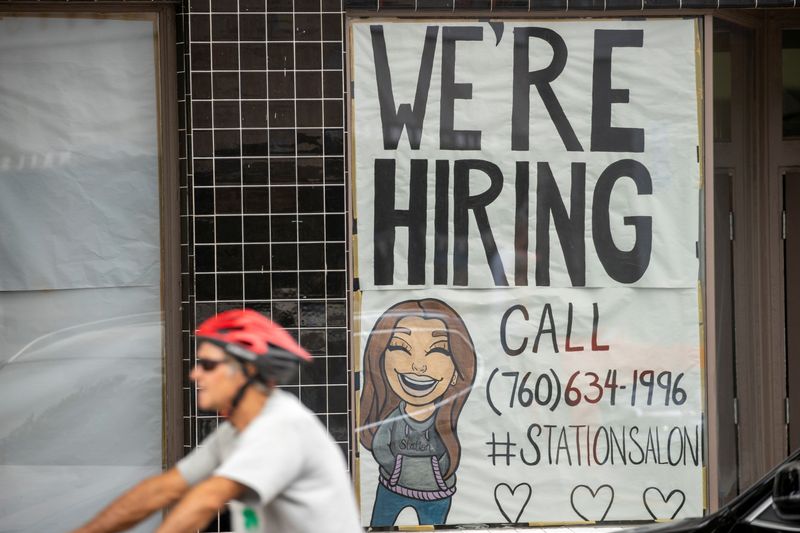(Bloomberg) -- The U.S. economy has splintered along state and city lines, with the speed of the rebound largely dependent on the magnitude of local business restrictions to combat an unending surge in Covid-19 cases.
California and Illinois, where some of the strictest measures have been imposed, saw jumps in state unemployment filings this month that helped push the weekly U.S. total to a three-month high. Both states also had November unemployment rates above the national level of 6.7%.
In Florida, where many businesses are permitted to operate at full capacity, state jobless filings have hit the lowest since March and the November jobless rate was below the national average, even with tourism employment still depressed.
And even with a new $900 billion stimulus package approved by Congress late on Monday -- extending and boosting relief for unemployed Americans -- the road to recovery will continue to be uneven in different regions.
Recent data make clear there’s a trade-off between jobs and business restrictions. The economic reality for workers and firms in a place where business is generally open is vastly different from those living where things are mostly closed.
Yet higher mobility also comes with potentially devastating health consequences. Nationwide, more than 300,000 people have died from Covid-19, and the recent acceleration in infections and deaths is showing little sign of abating.
A major problem is that lockdown measures are often reactive -- implemented when the virus is already out of control -- rather than proactive, said Joshua Barocas, an infectious disease physician at Boston Medical Center. For workers who have managed to keep their jobs, many are faced with choosing their health or their paychecks, he said.
“Me beating the drum of ‘Stay home, stay home, stay home,’ does nothing,” Barocas said. “It is a combination of proactive restrictions, coupled with support -- for both individuals and businesses -- and creative solutions to sort of reduce the overall probability of transmission.”
The situation has been particularly frustrating to restaurant owners, at least those managing to stay in business after many closed permanently and laid off workers during the pandemic.
In San Francisco, Ryan Cole spent thousands of dollars outfitting his restaurant’s patio with a roof and heaters in the hopes that The Vault Garden could attract enough guests to cover the bills. Earlier this month, outdoor dining was shuttered and Cole furloughed all 35 of his workers.
“People are just exhausted by the back-and-forth change,” he said.
Across the country, in Jacksonville, Florida, Sam and Kiley Efron’s restaurant, Taverna, remains open in part because local authorities allow al fresco dining. They’ve spaced tables six feet apart and reduced indoor seating by half. Sales are down about 30%, but it’s enough to cover expenses, including paychecks for about 50 employees.
“I’ve talked to friends in other states. I am really grateful to be living in Florida right now,” Sam Efron said.
The tougher restrictions are frustrating restaurateurs like Cole, especially when data suggest other measures may be helpful. A study by researchers at the Federal Reserve Bank of Boston found mask mandates are effective in reducing at least half of the increase in Covid-19 cases and deaths stemming from increased mobility.
In Duval County, where Jacksonville is located, businesses and schools are largely open, though there is a local mask order. Adjusted for population, Duval’s daily new cases surpassed San Francisco’s in the last few weeks.
Yet Los Angeles County, which had tougher business restrictions during that period, has had a worse surge in infections since mid-November.
New York has seen mixed messages. Statewide contact-tracing data in New York state showed nearly three-fourths of all cases emerged from household and social gatherings in recent months, while just 1.4% stemmed from restaurants and bars.
In New York City, though, Mayor Bill de Blasio has warned of a potential new shutdown of non-essential businesses after the holidays, amid a jump in cases.
After Vaccines
Even after vaccines are widely available, regions where lockdown measures have generally been stricter -- especially those that depend on hospitality and tourism -- are likely to have a more difficult time recovering because many businesses have closed for good.
Los Angeles, New York City and Chicago, where shutdown measures have been strict, have the greatest number of permanent business closures among all U.S. metro areas, according to a September report from Yelp (NYSE:YELP) Inc.
In the year through October, the economies of states with more restrictive measures, like California and New York, have fared worse than those with looser rules, like Florida, Georgia and Texas. That’s according to a coincident index -- or proxy measure of state economic growth -- produced by the Federal Reserve Bank of Philadelphia.
State-by-state unemployment rates illustrate the economic divide, though the correlation with Covid-19 caseloads is less clear.
The jobless rate is below the national average in Tennessee and Oklahoma, where business activity has resumed at least somewhat -- but it’s been accompanied by some of the sharpest increases in new cases over the past two weeks, according to Johns Hopkins data. In Vermont and Nebraska, which have the lowest state jobless rates, cases have been on a downward path.
The concentration of industries also plays a role. The jobless rate remains above 10% in Hawaii and Nevada, both hospitality-dependent economies suffering from declines in tourism. Hawaii has imposed and enforced strict measures on travelers to the state and a new statewide “pause” in Nevada went into effect Nov. 24.
“The way that we do business has to change with Covid, but where I think the frustration really kicks in is the unwillingness to build some flexibility in the rules,” said Mark Vitner, a senior economist at Wells Fargo (NYSE:WFC) & Co. “Really what we should be doing is trying to find ways that we can do as much business as we can possibly do safely.”
©2020 Bloomberg L.P.
